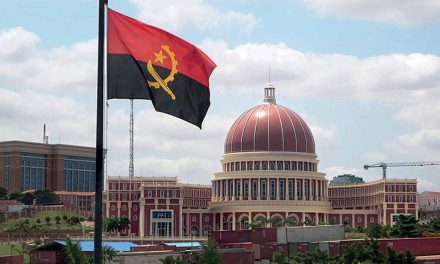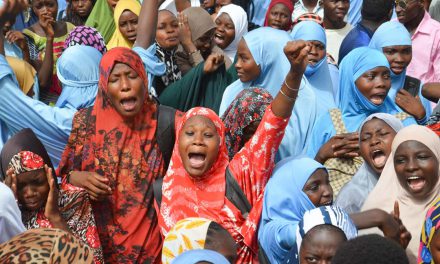African-Americans have the potential to shape relations between Africa and the US
As the Joe Biden-Kamala Harris administration gets under way, there are important collateral developments that may give momentum to what has been a growing consensus on a much-needed rethinking of US-Africa policy. The ascension of New York congressman Gregory Meeks to chair the House Foreign Affairs Committee, the first member of the Congressional Black Caucus (CBC) to occupy this strategic foreign policy gateway, is a major advance in African-American foreign policy influence.
Meeks should add much-needed political will to the chairmanship of the Africa Subcommittee, headed by fellow Black Caucus member Karen Bass, while veteran Caucus member Barbara Lee, who formerly served on the staff of Ron Dellums, takes over chairing the equally strategic House Appropriations Foreign Aid Subcommittee.
These developments are accompanied by President Biden appointing the former assistant secretary of state for Africa, Linda Thomas-Greenfield, as US ambassador to the United Nations. Never before has there been such a high-level pivotal concentration of forces among African-Americans in the US official foreign affairs establishment, with the potential to shape or reshape relations between Africa and the US and American foreign policy more broadly.
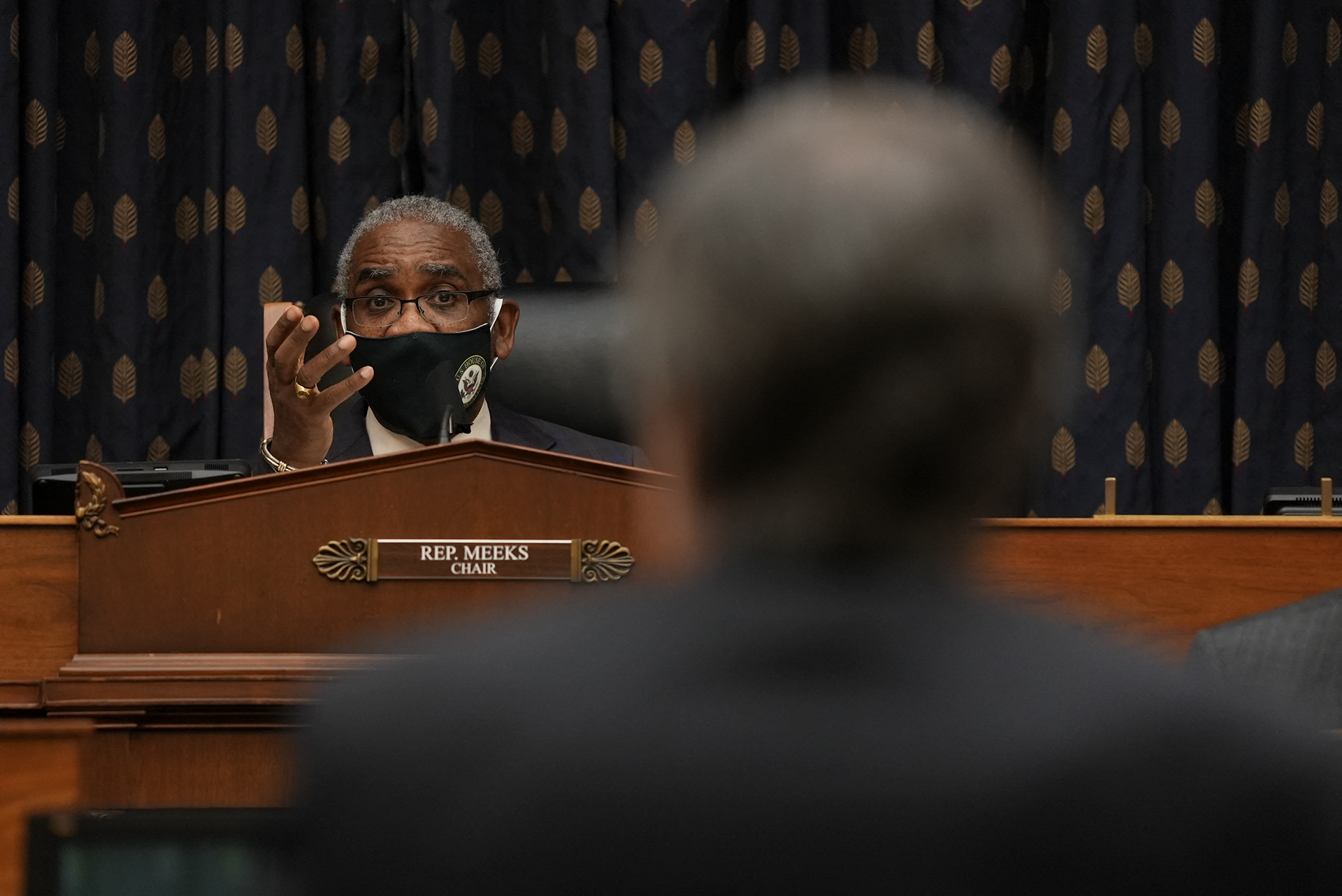
New York congressman Gregory Meeks at the House Committee On Foreign Affairs, 10 March 2021, on Capitol Hill in Washington, DC. Photo: Cedeno-Pool/Getty Images/AFP
This historic black convergence at executive and legislative levels places major pressure on the occupiers of these roles to deliver long-awaited alterations in how the US relates to Africa, if not the world, more broadly. That said, what about the level of African-American intellectual and activist engagement outside government and within academia to interact with this new governmental cohort of African-American leadership in Congress and in the Biden-Harris administration? Hence, the propitious timing of the 19 February symposium, convened by Howard University’s Center for African Studies on ‘Rethinking US-Africa Policy and the Role of HBCUs’. This event could not have come at a more timely moment and in a more fitting venue of historical engagement in academic African area studies and African-American African affairs initiatives.
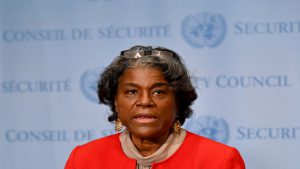
New US Ambassador to the United Nations, Linda Thomas-Greenfield, on February 25, 2021 in New York City. Photo: Angela Weiss/AFP
Howard University was the venue for the launch of the African Heritage Studies Association (AHSA) in 1970, in the aftermath of the African- African diaspora 1969 revolt at the Montreal African Studies Association annual international conference. This set in train an era of black academic activism in African and emerging African-American/Black Studies at American universities over the next decade.
Howard also hosted the CBC-sponsored African-American National Conference on Africa in what proved to be an aborted attempt to launch an Africa lobby but for the controversy of caucus members having signed on to Bayard Rustin’s widely published ‘Black Americans in Support of Jet Planes for Israel’ in 1970. Otherwise, this momentum eventually lay the ground work for the caucus-led ‘African-American Manifesto on Southern Africa’ in the lead-up to the founding of the Trans-Africa Lobby for Black Americans and the Caribbean, spearheading anti-apartheid protest.
These developments are yet to be exhaustively critically assessed in understanding the lack of a mobilised post-apartheid protest African affairs activist constituency in 2021. This could prove the Achilles heel of black-led US-Africa policy progress during the Biden-Harris era.
We are now in a new day as we enter the third decade of the 21st century. There is an urgent need now to try and discern the current and future challenges facing Africa within the global strategic context and in terms of how US policy toward the continent may require reconceptualising. With the launch of the African Continental Free Trade Area (AfCFTA), this requires contextualising trade as a major, if not central component driving pan-African continental integration, and as a trajectory occurring within a dynamic geopolitical landscape of external influences interacting within the complex inter-African terrain of the African Union (AU).
The basic challenge is reshaping an Africa policy prioritising the strategic and geostrategic over the programmatic in as much as there already exists a proliferation of Africa programmes, some with more strategic significance and potential than others, none perhaps more so than in the area of trade and the future of the African Growth and Opportunity Act (Agoa); this is at a time when AfCFTA has been launched.
This is an area that strategically relates directly and urgently to the regional and continental integration imperative in defragmenting the colonial political map of an Africa of interdependent states of varying degrees of viability. Within this context, it is urgent that national sovereignty becomes shared sovereignty – a pan-African imperative. This challenge is at the very heart of the AU’s Agenda 2063, which aspires to transform the continent in anticipation of the centenary of the AU’s founding predecessor, the Organisation of African Unity (OAU).
Agenda 2063 should inform US-Africa policy in keeping with the AU’s aspirational Continental Free Trade Area aim as the integrationist centrepiece for realising the African Economic Community as laid out in the Lagos Plan of Action.
This is where the Biden administration might consider focusing efforts within a context informed by the need to strategically, as well as programmatically, transition Agoa into a US-AfCFTA relationship that also factors in the fast-changing global geo-economic and geopolitical landscape of trade. Given the complexity of this challenge, the Biden administration should, in conjunction with the AU and the UN Economic Commission for Africa, begin engaging the CFTA secretariat in Accra, headed by South African Wamkele Mene, in a post-Agoa dialogue of transition into the next phase of Africa-US trade relations.
This should factor in a strategic role for the AU’s regional economic communities (RECs). Such a dialogue would necessarily unfold against the backdrop of reviewing how Africa has benefited from Agoa while reversing the bilateralism of the Donald J Trump administration’s highly politicised Africa trade agenda into one placing the AfCFTA at the centre of US-Africa trade strategy.
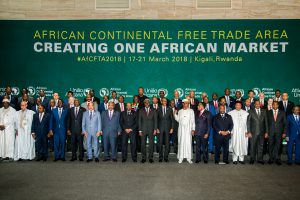
The African heads of states and governments pose during African Union (AU) Summit for the agreement to establish the African Continental Free Trade Area in Kigali, Rwanda, on March 21, 2018. Photo: STR/AFP
The Trump administration’s bilateral ‘trade reciprocity’ approach in negotiating a trade deal with Kenya represented what was promising to unfold as a setback for African trade integration in moving beyond the unilateral trade preferences of Agoa. As a recent Brookings Institution analysis noted: “Although these negotiations could produce the first bilateral trade agreement between the US and a sub-Saharan African country, a shift from the regional preferential trade agreements to bilateral free trade agreements could undermine the growth of smaller countries, who may not be of enough economic interest to the United States. Bilateral agreements could also undermine efforts to create a regional economic bloc through the African Continental Free Trade Area (AfCFTA).”
Indeed, Kenyan President Uhuru Kenyatta’s decision to strike out on his own in spite of the CFTA generated no small amount of controversy within Kenya’s trade community and in Africa as a whole. If Kenyatta’s disruption of the fledgling CFTA was not controversial enough, the Trump administration’s reported conditioning of the trade deal on Nairobi adopting a higher-profile pro-Israel posture amid Trump’s Israel ‘normalisation’ drive, added additional fuel to the fire in reflecting Trump’s complete disregard for Africa; and this is not to mention his veto of Nigerian Ngozi Okonjo-Iweala to head the World Trade Organization, leaving it in limbo until rectified by Biden.
It is too early to discern where the Biden administration may be headed in Africa policy, although suspending bilateral trade negotiations with Kenya is an obvious place to start, pending the administration staffing up its Africa team at the State Department and undertaking a thoroughly comprehensive review of the Trump agenda and initiatives.
However, it seems safe to venture that the outgoing administration’s Africa agenda had much to do with its pro-Israel mid-east priorities in close collaboration with Egypt, Saudi Arabia and the United Arab Emirates in pursuit of its destructive “maximum pressure” campaign against Iran as it had to do with Africa.
Hence, its decision to violate international law and in recognising Moroccan sovereignty over Western Sahara, bolstering the military wing of Sudan’s fragile transitional government in manoeuvring Khartoum into “normalising” with Israel in exchange for delisting it as a state sponsor of terrorism, suspending aid to Ethiopia to force Addis Ababa into concessions to Egypt in mediating the stalemate over future operationalising of the Grand Ethiopian Renaissance Dam (GERD), and making the already problematic trade deal with Kenya conditional on high profiling Nairobi’s already normalised relations with Israel.
Reversing these Trumpian geopolitical complications for Africa’s strategic autonomy and integrity in relation to the mid-east and specifically, Persian Gulf sub-imperial aims, cannot be separated from a broader strategic agenda advancing the continent’s aspirational 2063 economic integration revolving around CFTA implementation. For starters: breaking the logjam on Western Sahara by UN ambassador Thomas Greenfield, through the Security Council appointing a new UN envoy to mediate the implementation of a referendum to arrive at an equitable self-determination agreement that kick-starts the Arab Maghreb Union as a functioning regional economic community within the AU system and CFTA. However, at this point, it is unclear if the Biden administration is going to reverse Trump’s decision to recognise Moroccan sovereignty over Western Sahara.
There is a growing urgency to resolve the GERD standoff between Egypt, Sudan and Ethiopia, where a pooling and sharing of sovereignty in the interest of Nile Basin regional cooperation should receive priority. Here, Ethiopia will have to concede on national sovereignty within the interdependent reality of the Nile conundrum. Resolving this stalemate has to happen in conjunction with securing Sudan’s civilian democratic transition while addressing Ethiopia’s crisis in Tigray, which is critical in its democratic consolidation and stability.
All combined, stabilising the Horn of Africa is crucial to advancing the “Cape to Cairo” eastern and southern African tripartite FTA component of CFTA. This, in turn, has wider Afro-Asian geo-strategic economic potential of convergence with mega-trade trends in the East Asia/Indo-Pacific, where Biden will have to revisit the Comprehensive and Progressive Agreement for Trans-Pacific Partnership, on the one hand, and the Regional Comprehensive Economic Partnership on the other, both of which factor in the Association of South East Asian Nations (ASEAN) economic community. With Africa’s demographic dynamism set to eventually overtake both China and India in population by mid-century, a CFTA-ASEAN Indian Ocean geo-economic convergence could reshape the global strategic landscape. But let’s not leave out the Atlantic, where, if Biden can overcome the foreign policy establishment’s North Atlantic bias in favour of a whole of transatlantic vision, CFTA relevance enters the equation as well. As such, Africa’s diaspora as well as Africa itself has a major stake in affirmatively promoting accelerated regional and continental integrationist evolution.
How might these projections inform US-Africa policy and Africa-US relations? Perhaps a closer diplomatic and aid US-AU relationship might be the place to start given Washington’s posting of an ambassador to the AU and an AU ambassador posted in exchange to the US. However, it is not clear how deep this relationship is and whether or not it might be upgraded into the centrepiece of US-African relations in a manner also factoring in a greater role for the AU’s regional economic community (REC) pillars. These are in need of major strengthening and capacity-building as well as rationalising as building blocks for accelerated continental free trade implementation. This is where House Foreign Affairs Committee Chairman Meeks broke new policy ground in suggesting: “We should establish dedicated US embassy country teams for the Regional Economic Communities, separate from the bilateral mission and staffed by representatives from the state department, US Agency for International Development, the department of defence, and the commerce department. America will not be relevant if we’re not present in these bilateral and multilateral fora.”
In relating such an RECs outreach to a post-Agoa transition, might it not be possible for such a transition into a CFTA-US agreement to involve regionalising the Agoa forum within the regional economic communities? Hence, the possibility for the Biden administration engaging the AU and its triumvirate governing partners in ECA and the African Development Bank (AfDB) in establishing a high-level AU-US Integration Forum accompanied by regional economic community-US forums for dialoguing and brainstorming possible differentiated regional phasings of Agoa into a US-CFTA architecture. Here, African “lessons learned” from the highly disruptive Economic Partnership Agreements (EPAs) experience imposed by the European Union might serve a valuable purpose in informing how the US and the AU, in conjunction with ECA and AfDB, might proceed in arriving at an equitable Africa-US trade regime, accelerating continental integration into the eventual African Economic Community. Perhaps a US envoy to the CFTA in Accra liaising with the US ambassador to the AU in engaging ECA and AfDB as well might be considered a possible nexus of US-AU diplomacy.
While the focus here has been on Africa-US trade relations, the same template might serve a purpose in the peace and security sphere as well. Operationalising the AU African Peace and Security Architecture (APSA), including its maritime dimension, is critical to stabilising Africa’s complex and fragmented inter/intra-state landscape for advancing economic integration within CFTA.
On the American African affairs constituency side of US-African relations, advancing a strategic policy agenda reflecting Meeks’ regional economic communities caveat will call for a new approach to constituency-building in a departure from the protest activism that animated the anti-apartheid-centred Africa lobby of the 1970s and 80s. This is where HBCUs could play a crucial role in developing Friends of ECOWAS, Friends of SADC and Friends of the East African Community and/or of IGAD (the Inter-Government Association for Development) as US-based complements to a revived SADC-US forum with similar forums for ECOWAS and other RECs. Such an approach could, in the process, strengthen ties between African-Americans of African immigrant descent and African-Americans of historical lineages as a reflection of black America’s increasing diversity.
Finally, lessons learned from the 1970s and 80s would emphasise the need for a broad-based coalitional African affairs constituency, not one organised along the neo-Garveyite principles that have much to do with why there is no mobilised constituency at present. Such a constituency would also need to steer clear of the toxic ideological and paranoid politics intersecting with racial separatism of that period. Hence, the importance of an HBCU role in African affairs constituency renewal. The 19 February Howard University symposium might well have marked such a new beginning.
Francis Kornegay is Senior Research Fellow at the Institute for Global Dialogue-University of South Africa and alumnus of The Wilson Centre in Washington. His most recent co-edited publication is: Africa and the World: Navigating Shifting Geopolitics (Mapungubwe Institute of Strategic Reflection, 2020).


